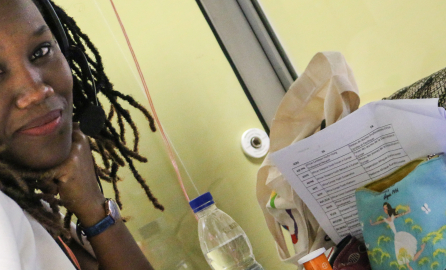@media (max-width: 1333px) { .mobile-img { margin-left:0px !important; } .mobile-video { margin-right: 0px !important; } .mobile-quote, .mobile-table { display:none; } } .drop-cap { font-size: 6em; float: left; line-height: 75px; padding-right: 8px; padding-left: 0; } .drop-cap-2 { font-size: 3em; float: left; line-height: 35px; padding-left: 0; }
The linguistic diversity of Africa is stunning, but with over 1,500 languages spoken across the continent, communication can be a challenge – even within countries themselves. Good interpretation is needed for effective cooperation; training interpreters on the continent can provide this.
"If you want the different African countries to cooperate, first of all they need to be able to speak together,” said Paule Kekeh, Staff Interpreter at the European Commission's DG Interpretation and the focal point for the Pan African Masters Consortium in Interpretation and Translation (PAMCIT).
Africa’s colonial past has meant that cooperation between African countries has historically followed linguistic divides. “French-speaking Africa would cooperate with French-speaking Africa,” explained Kekeh. “Portugese-speaking regions would speak with Portugese speaking regions, and so on.”
The rise of Pan-African organisations following decolonisation in the 1960s, changed this, with the growth of the private and cultural sectors further contributing to the increasingly connected nature of the continent.
|
Watch Paule Kekeh discuss the Pan African Masters Consortium in Interpretation and Translation (PAMCIT) here: |
Given the linguistic challenges, the need for translators has only grown. From conference translation in Pan-African and transcontinental dialogues to service provision in communities who do not speak the national language, communication has become a prerequisite to cooperation.
Structures for training
“As an interpreter you convey a message, but it’s not only words – you convey a culture, a history, your knowledge of the economic and political relations, and you can do that best when you’re homegrown,” said Kekeh.
In the past, however, most interpreters came from outside Africa. Local ones had no choice but to get training in the West. High costs and complicated visa policies, however, meant that only a select few could pursue this path.
The result was the emergence of an informal market of self-trained interpreters across Africa. “Their services were not optimal,” said Kekeh.
This changed with the creation of the PAMCIT programme – or the Pan-African Masters Consortium in Interpretation and Translation – in 2014. The programme brings together five African universities to offer master’s degrees and doctorates in translation and conference interpreting and is co-funded by the European Commission and the United Nations office in Nairobi.
“As an interpreter you convey a message, but it’s not only words...”
Today, over 70% of PAMCIT graduates find employment, with many working for the very organisations that spurred the increased demand for interpreters, including the African Union and the Economic Community of West African States.
The programme’s growth has also meant that more women have started to work in the sector. “Interpretation used to be a male-dominated profession in Africa,” said Kekeh. “It still is, but what we’ve seen is that the key to women accessing this market was the qualification.”
PAMCIT has made this happen, Kekeh added. “Interpretation and communication are relevant everywhere, so that’s why we’re here,” she said.
Communication as part of life
For Pamela Amoah, a student of interpretation, this has held true. Amoah is pursuing a master’s degree at the University of Ghana, one of the five PAMCIT affiliates.
“Communication is something that I come into contact with every day,” she said. “My country is multilingual; we have so many ethnic groups and each one has their language. It’s a way of life.”
|
Watch Pamela Amoah discuss her studies with the Pan African Masters Consortium in Interpretation and Translation (PAMCIT) here: |
In addition to her mother-tongue of English, Amoah is fluent in French and Akan – the language of the ethnic group of the same name, spoken by over half of Ghana’s population.
Having interpreters versed in local languages is one of the many benefits Amoah sees in a homegrown translation sector. “It’s important especially for community and public service interpreting, because not everybody speaks the official language,” she said.
In Ghana, only 67,1% of the population speaks English. This creates obstacles in everything from administrative procedures to hospital visits.
This was the case for one of Pamela’s teacher, who is a member of the Ewe minority group in Ghana. When she went to a hospital for a pregnancy check-up, the teacher found herself unable to communicate with a hospital staff member, who spoke a different language. “She felt left out, excluded,” Pamela said. “This would have not happened if there had been an interpreter.”
While continuing her studies, Amoah hopes to become a conference interpreter with an international organisation after graduation. She also aspires to become a trainer of interpreters and translators – at her home university in Ghana – to carry on the programmes’ mission.
This article was written by Craig Hill, Journalist and Content Editor at Capacity4dev, with reporting and editing by Bartosz Brzezinski.

Log in with your EU Login account to post or comment on the platform.